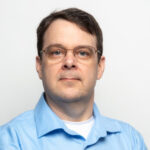The UCI Master of Data Science (MDS) program held a Q&A-style panel discussion on April 21 with industry leaders in data science. This discussion was held in collaboration with the Southern California R Users Group (SoCal RUG), a local forum of people who use the statistical programming language R.
Bella Feng, Sep Dadsetan and John Preach were the featured panelists. Along with Ryan Benz, the three of them shared their experiences working in the data science industry, focusing on their career development over the years.
Career Growth
The first question of the night was how one can stand out at work and form positive relationships with their colleagues. Bella Feng, head of statistical programming and clinical trial data science at biotechnology company EQRx, started the discussion by encouraging everyone to be engaged and open-minded. Feng mentioned that she got her first job because of a presentation she did at a statistical analysis system (SAS) conference. To Feng, it’s important to build strong relationships with those around you because they can pay off in the long run in your career.
Sep Dadsetan, who is the executive director of real-world evidence analytics at healthcare and artificial intelligence company ConcertAI, agreed with Feng and emphasized the significance of knowing the structure of your company and how you interact with your colleagues to understand the impact of your role. “It’s really important to send an email, introduce yourself and try to connect with others and see what they’re working on,” Dadsetan said. “I think through that, you’ll see… where you can contribute and how the company is organized.”
In addition to networking, John Peach, principal data scientist at cloud technology company Oracle and member of SoCal RUG, says using data to inform decisions and be customer-focused while keeping the company vision in mind can improve your work performance and relationships with your clients. “For data scientists, one of the big parts of the job is to be a trusted adviser. Your job is to help the people that make decisions make the decision that’s based around what the data is telling them as opposed to what their gut says,” Peach said. “Make sure that what you’re going to do has some real impact along the way, and you should be able to identify everything that you’re doing and what the impact is going to be like [for the customer].”
Biotechnology company Seer’s director of data science and SoCal RUG member Ryan Benz led the latter half of the panel’s discussion on career growth with a lighting round to discuss career growth and pitfalls.
Benz and the panelists noted that being curious, dependable, and a problem-solver and having people skills are signs that an employee may be ready to be promoted. When asked to share some examples of what might set back professionally, they said being indecisive and having a limited or negative mindset may hurt you. To avoid stumbling in your career, Peach re-emphasized looking at the bigger picture and advised performing at the level you want to be promoted to and taking ownership of your work.
Management vs. Individual Contributor Career Tracks
The panel discussion shifted to focus on two career tracks: being a manager versus being an individual contributor.
Peach described one of the differences between being a manager and an individual contributor being the scope and type of their responsibilities. While individual contributors manage themselves and are responsible for their projects, a manager’s role entails managing people, such as overseeing personnel and creating teams. In that sense, being a manager is almost like being a parent, according to Feng.
Dadseten added that good managers understand the scope of their own knowledge and skills and will help you find the support you need if they cannot personally provide certain resources.
The panelists then discussed how one knows if being a manager or an individual contributor is the right role for them. Understanding how you want to manage your impact at work is one thing to consider.
To give an example, Peach noted that being a technical leader allows you to have an impact throughout your organization, but your impact is still focused on your area of expertise. On the other hand, a manager will have a broader impact on both projects and the people they’re guiding. “As you’re going up the IC [individual contributor] track … [ask yourself if] you are enjoying the project management aspects more than you’re enjoying the technical hands-on work,” Peach said. “That’s a good indication that maybe taking on some management role would be interesting to you.”
Being a manager also gives you more influence in the workplace, which is one of the things Feng enjoys. “I really like the influence part,” said Feng, adding that she championed the use of R in a previous role but was unsuccessful because she was not a decision-maker. “So once there was a reorganization, my initiative was killed because everything was outsourced. … But right now, I’m not an individual contributor and more like the decision maker, so I can decide.”
Dadsetan said that as you progress in your career, it’s good to take note of what you like and dislike and what you’re good at and not good at because these are all factors that come into play when deciding what role you find best fits you. “I think it’s important to realize that it’s not a decision you have to make now and can never go back to ever,” Dadsetan said. “There’s relatively fluidity.”
Balancing Personal & Professional Life
Career advancement inevitably comes with more expectations and responsibilities that can even interfere with your personal life. Benz said that managing stress and experiencing burnout are not talked about enough even in school, so the panel discussion ended with everyone sharing how they handle the demands of their careers.
Dadsetan acknowledged that you might hit the ground running straight out of college, but it’s imperative you don’t overwork yourself and start drawing lines as needed. “As an individual, you have to balance being fresh out of school, wanting to make a good impression, wanting to do your best … so that might require you to [work] overtime,” Dadsetan said. “But it’s also really important to be listening to your body and [know] what it is that you want to prioritize in your life and take stock of what matters to you.
Setting boundaries at work is also a way that Feng maintains a healthy work-life balance. In the past, she juggled a number of roles and responsibilities all at once at work, causing her to burn out. Feng said attending a weeklong retreat and connecting with herself without electronics helped her recover and be more in tune with her body.
Another way to prevent burnout is by learning to separate your personal and professional life. “It’s a job, it’s not my identity,” Peach said. “For a very long time, my self-identity was tied to what I was doing … making that separation has helped a lot.”
It can also help to find purpose in your career so that you are moving up, learning new things, and specializing rather than being stuck doing the same tasks or trying to do everything at once. “I personally am much better if I know that I’m having personal growth, I’m learning a lot,” Peach said. “Focus on where your talents are. As you go up in your career you’re going to be more and more specialized in what you’re known for, so focus on doing that as opposed to doing everything.”
— Karen Phan



